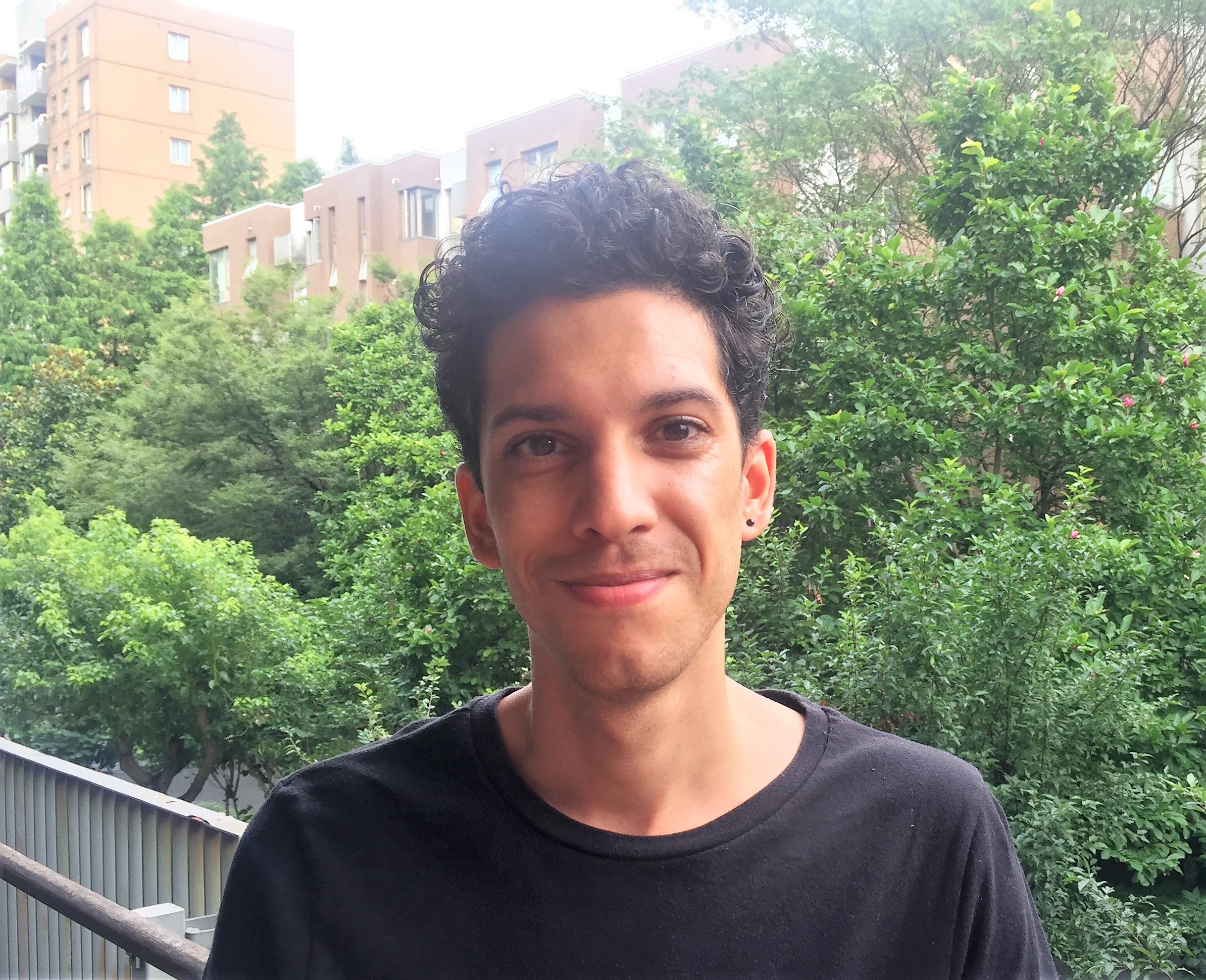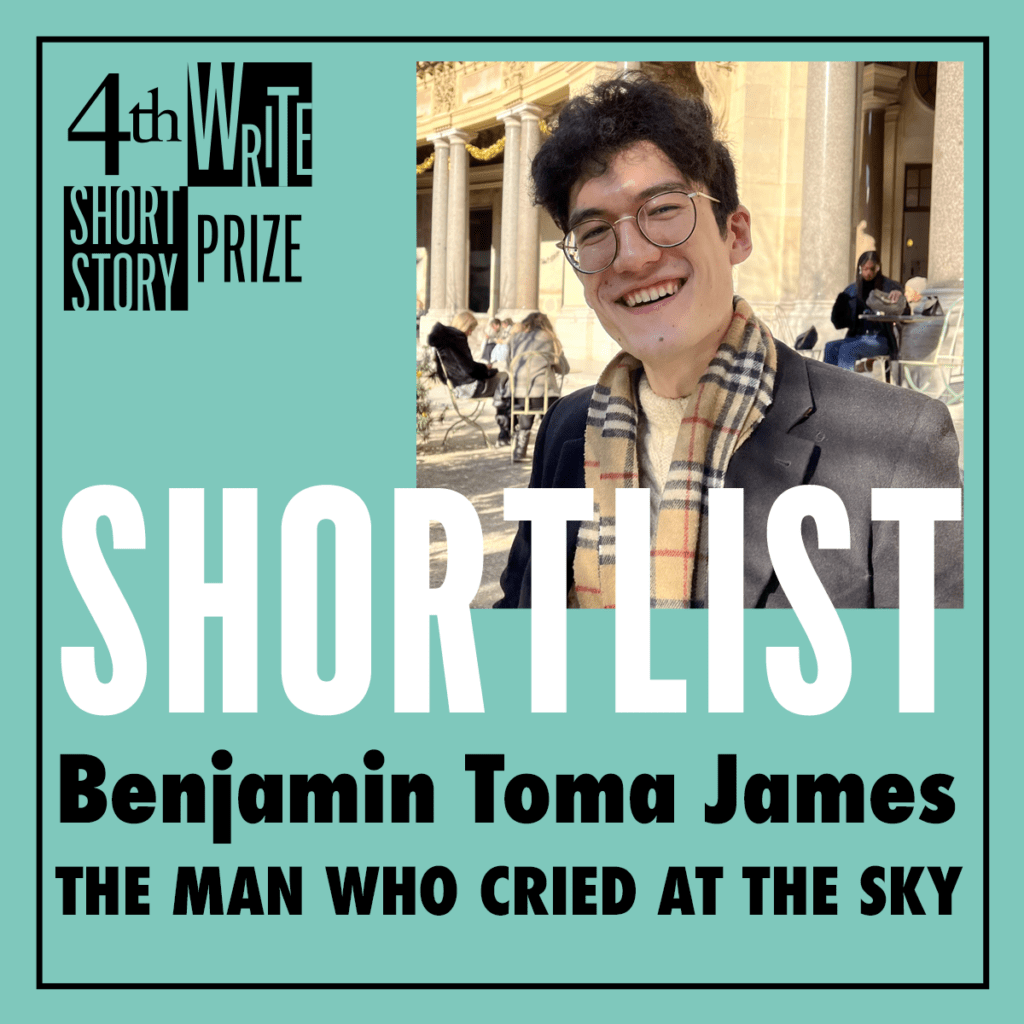A mass of turtles had gathered at the edge of the stream. They were floating upside down, tapping against one another. Liú Fāng’s father used a net to collect them and passed them to her. She organised them into rows of four on the path beside the stream: there were twenty-eight in total.
– What happened? she asked.
Her father shook his head. He crouched down and picked up each turtle one by one, holding them close to his face. Liú Fāng ran her fingers along the shells and studied the contours and quadrants. Each turtle’s eyes and mouths were closed. Liú Fāng’s father bent down by the stream and dipped his hands into the water.
– Is it the water? she asked.
– Let’s go back.
That was the day that the stench invaded the village of Xīliú and decided to stay. It was a disgusting thick stench that caused each villager to stop working or resting to go in search of the source, which they did not find. The stench permeated the village, clinging to the villagers’ clothes, clogging their throats, and burning their noses; it trotted along the cobblestones and hung over the waterways and streams that ran through the village; it snorted at the trees, causing them to wither; it draped itself over the tea plantations, which all became barren; it waded in the streams, turning them to milk; and it nestled into homes and caused villagers to vomit.
It was a stench worse than death, some remarked, and soon enough the villagers were able to test these assertions when people began to die. The elderly fell first. One day they all experienced crackling coughs and became bed-bound. Within a week the cemetery needed thirty new plots. The whole village came to pay their respects, but so too did the stench. Stacks of incense were lit, but the stench was unmoved.
Soon afterwards the youngest children became sick, unable to hold any food; they wheezed in the evenings and cried in the night. The villagers searched for the source of the stench but could find none. Offerings were made, and everyone repented of their past misdemeanours. But the stench only became more acrid and intense as the hot months arrived and the young children died.
– Is it something to do with the turtles? Liú Fāng asked her father.
– It could be.
He hiked to the neighbouring town to notify the local governor and ask for assistance. After a few days some inspectors and officials arrived in a jeep. They wore masks and inspected the sewage-system. After an hour or so they ate a meal at Marrow Heads’s kitchen. She served them green beans, mushrooms, marrow and rice. They drank and smoked, laughing and shouting in thick twangs. Villagers grouped in the courtyard to wait for them to outline the solution. When the visitors made to leave, the largest of them informed the villagers to flush the sewage system. Lù Feī told them that they had already done that. The official wiped his purple loafers with a handkerchief and stepped into the jeep. He hung from the doorway, searched for Lù Feī, and said: flush it again, then. Lù Feī fought for their attention once more, but they wound their windows up. Wú Zhī demanded that they do more. The official appeared to swear and gave her a look full of indecent fire. Then they drove away.
Θ
The village of Xīliú was created when Yǔ tamed the great flood and shaped the streams of the village to spell ‘Spring Water’ – that was the story that Liú Fāng’s father told her on their first ever hike into the surrounding forests. As she grew, and he took her on more journeys into the forests around Xīliú, he told her about the surrounding cave systems, and how he had once found oracle bones when he was a boy her age. He told her how Lǎo Zǐ had taken refuge in the village and had gathered with other scholars to discuss matters of Heaven and the Way. He claimed that Xún Zǐ had first announced that ‘a man’s nature is evil’ to the villagers of Xīliú. He told her that Zhāng Héng had discovered pi on the Talon Peak. He told her how Zhāng Qiān had stopped in Xīliú on his way to central Asia and had been so impressed with the village that he had said that it would last for eternity. He told her that Luó Guàn zhōng had written the first chapters of Sān guó yǎn yì at the courtyard of their home, and that Gě cháo fǔ wrote a scripture in the forests of Xīliú which he then buried somewhere because he was afraid of its meaning. He told her that in the Purple Valley there had been a statue of Guān yīn that could only be seen by those who had a pure heart. He told her that Táng Tài zōng – the quintessential emperor – had once seen a horse made of fire riding through the waterways of Xīliú. He told her that Wǔ Zé tiān had been banished to the Buddhist temple that overlooked Xīliú from the hills. He told her that at one time every villager had one of Wú dào zǐ’s paintings in their homes until one evening each painting had turned into salt.
– On the subject of salt, he said, have I ever told you about Huáng Cháo and Wáng Xiān zhī?
– No. Who were they?
– They led a rebellion against the Tang dynasty when a famine struck the peasants. Huáng Cháo was a smuggler and a rebel. Up there – see the hollow in the peaks, there? They kept salt there.
– Did they?
– Yes.
– Why so high?
– To keep it safe.
He told her about Cài jīng, who had died en-route to exile; he told her that he had been executed where the villagers of Xīliú now grew tea.
– Executed? Who was he?
– You don’t know?
– No. Tell me.
– Daughter – have you been reading?
– Tell me, please.
– He was a treacherous and corrupt man.
He told her that in the Song dynasty peasants began to abandon the land of Xīliú to move to the cities. He told her that Xīliú became abandoned, save for the monks of the Buddhist temple, until the Yuán dynasty when – as everyone knows – merchants greatly benefited. The Yuán dynasty built roads and canals to facilitate travel, and Xīliú became a rest-stop for travellers, bandits, and scholars. Although the waterways were not sufficiently wide enough to transport large goods, it still served as an important route for small groups of people to avoid the Purple Valley, which was notoriously difficult to traverse in all seasons.
He told her that Zhū Yuán zhāng spent time at the Buddhist temple, and that he had made Xīliú famous for its honey, the honey which was sourced from the surrounding forest on Talon Hill, and which Liú Fāng’s father had taught her to harvest. He told her that Zhèng Hé visited Xīliú and sketched the outline of the Porcelain Tower of Nanjing on a roll of paper whilst he sat beside the very stream they were sitting at now.
– Father, are these stories true?
– They are stories.
– But are they true?
– Well – have you heard of Lǐ Zhì? You will like him. He was a critic of orthodoxy; he was an outsider who promoted the rights of women and the lower classes. He was imprisoned, and while in prison he committed suicide.
– When was this?
– During the Ming dynasty. He stayed in Xīliú in 1550 – I think Wú Zhī is related to him.
– Because they share a first name? You make things up, father! How can one small village have all these stories?
– Well – have you heard of Wèi Zhōng xián? He was a eunuch during the late Ming dynasty. He rose through the imperial courts to become a close minister of Zhū Yóu xiào, Míng Tiān qǐ. He stole the vast silver deposits that Xīliú had at that time. When he died, his younger brother Zhū Yóu jiǎn became the next emperor – the Chóng zhēn emperor. Wèi Zhōng xián was tried for war crimes and he committed suicide.
– Are you going to tell me that he committed suicide in Xīliú?
– Yes! How did you know?
– Father, your imagination is reckless.
Θ
When the stench arrived, Liú Fāng’s father stopped telling her stories about the village. He no longer took her for hikes or taught her practical things or laughed with her. Liú Fāng thought that perhaps it was because she was growing to be a woman. She spent more time with her friends. They would sit at the bridge near the entrance to the village because that was where the stench was least powerful. Their feet hung over the waters, the colour of which reminded Liú Fāng of over-ripe eggplant.
– The heavens expelling corrupted dust? said Luó Gāng.
– The depths expelling corrupted dust, more likely, said Zhāng Mǐn.
– Yes, that sounds better.
– I heard, Wáng Píng began, that years ago a metal beast chose to live beyond the forest at the base of the mountain and that it caused our waters to sizzle and our trees to dry. I heard that the sky was once a colour that has been forgotten.
– Didn’t you once hear that a liquid lizard consumed a black cat? asked Luó Gāng.
– I didn’t hear that, I saw it with my own eyes!
– Didn’t you once hear that Xīliú was founded on the bones of a giant three-headed horse?
– No. I invented that to scare the children.
– The children, Zhāng Mǐn began, are we the children now? I wonder what will become of Xīliú when we are gone? Will this bridge be here in ten years? Will the old mill? Who will care for the cemetery? What will be left?
– The stench, said Luó Gāng.
– Ha! Yes, the stench. What do you think, Liú Fāng? Where does the stench come from?
– Something hidden.
Θ
With the elderly and the infants dead, the majority of the villagers agreed that Xīliú had been cursed, probably because of some ancient sin which had been rotting beneath them. Families began to leave. How long can one live on corn-husks? said Yú Fēi as he loaded his life onto a rusting trailer connected to his bicycle. How are you going to cycle through the forests? asked Lǐ Péi, a school teacher who had returned to Xīliú to care for his sick parents. Yú Fēi smiled at him, his black teeth like hanging bats.
Lǐ Péi spoke to other villagers, telling them of the value of the tea plantation and of the local honey, saying that Xīliú needed to survive. Most did not have the energy to listen to him. The stench, they said, was unbearable, and despite their efforts they had not been able to find the source or to cure the curse. They thanked him for his concerns and praised his filial devotion.
Liú Fāng’s father and mother agreed with the school teacher, as did Zhāng Mǐn’s parents. They all agreed to try to speak to the local governor again. But the next day Liú Fāng’s father collapsed while he was collecting wood. He lay in bed, fading; his chest was crackling. Liú Fāng asked her mother if they would be leaving for the city. Her mother replied that she could not yet make that decision, and that in the end Liú Fāng might have to choose for herself.
That evening Liú Fāng and her mother sat in the courtyard. They heard wheezing, crackling coughs, and the occasional screech. They lit incense and cooked sweet potato on a fire. The smoke from the incense and the fire joined together to fight against the
stench, holding it away from Liú Fāng and her mother for as long as it could, but they knew it was simply waiting for the right moment.
– It wasn’t always like this.
– What do you mean, mother?
– Xīliú. All of this. It wasn’t always like this. It’s so empty now. A great deal has changed.
– Father tells me endless stories about Xīliú.
– I know he does, she said, laughing.
– Does he think I will believe them all? Liú Fāng said, laughing too.
– No.
– Does he believe them all?
– No, no. He just loves stories.
– And Xīliú.
– In a way, yes.
– How much of what he has said is true?
– Well, she began, puffing her cheeks out, I would need to know what he has said.
– He once told me that a British man named something McCartney came to this village and tried to get the village to buy crates of opium, but the villagers chased him away. Is that true?
– It could be, if the man was British, yes.
– He said that Lín Zé xú wrote a letter to the British queen here in our courtyard.
– Haha! Yes, why not?
– He said that a part of the village had been destroyed by Hóng Xiù quán.
– Of that I’m not so sure.
– He said that Rú ān yì is related to Qiū Jǐn.
– I miss Rú ān yì.
– He said that when the Japanese invaded, the villagers hid treasures in the mountains, but that the villagers who hid them had been killed, so the treasures remain hidden.
– That sounds true.
– Tell me some things that you know are true.
– That I know are true?
– Yes – please, mother. I want to know about things which existed and that you know are true.
– There used to be pheasants walking along the beams of the houses. There used to be dragonflies the size of your face down by the Narrow Mouth. There used to be giant carp in the streams – orange, golden, yellow, grey. There used to be wild grains growing in the Iron Fields. There used to be mulberry trees and golden garlic. There were horses in the forests. There used to be hawkers; there used to be visitors. There used to be celebrations and laughter. There used to be a sky.
– A sky? There is a sky now, mother!
– No, I mean that the sky was awake with lights.
– Lights? Mother, are you awake now?
– There were – don’t laugh!
– I don’t understand what you mean.
– I mean this: that the sky above seemed endless – countless lights rippling the expanses above. It was as if all of this were endless.
– And where are they now?
– Gone, like all the people of Xīliú. They no longer exist.
– No, mother – they still exist.
– Yes, you’re right – everything always exists.
– The stench didn’t.
Her mother cleared her throat. The stench pushed forwards against the smoke of the incense and the fire, closing around Liú Fāng and her mother.
– Yes, the stench is new.
– Where is it from? Liú Fāng asked.
– If I knew I would destroy it.
Liú Fāng stared at the sky and tried to find a single light, but all she could see were dark clouds and thin wisps moving like the smoke of hot oil.
– Will father get better?
– I doubt it.
Θ
Liú Fāng’s father appeared to have aged some twenty years when she brought him hot water the next morning. He asked her to sit with him. His lobes appeared to be elongated like those shown on the chipped statues of the Buddhist temple in the hills behind Xīliú. He coughed, and his chest crackled. He spoke about how he thought that the rocks beside their compound were representations of mountains, the way that they were shaped in arcs, almost like brushstrokes.
– Father, tell me a story which is true.
– A story which is true?
– Yes – something that you know is true.
He paused for a long while, wheezing, his chest moving up and down at uneven intervals.
– Well, I remember when I was a boy. I used to go to the temple and study the faces on the statues – they had faces then. I used to ignore the calls of my father, can you believe that? He used to call me from the village, he wanted help, and even though I heard him I ignored him. I was a terrible son. When my mother died I went off and drank and played xiàng qí – can you believe that? Terrible. When you were born I made a vow to be a good father. I asked my ancestors to help me. But maybe I felt guilty. I don’t know. I remember something from when I was a boy: some men came with guns – they were boys too, really, but older than me – my father was unsure if they were soldiers. I don’t think they were. They came – they were delirious – delirious with something like power, but not really power. They broke all the statues in the temple – destroyed all the faces. They took things from Xīliú, too. I always tried to be a good father. Have we indulged in mere talk? Well – I always tried to be a good father.
– You were, father – you are.
Θ
Liú Fāng’s father and mother died within days of one another. Zhāng Mǐn’s parents died soon afterwards. They dug the burial plots together with the help of the school teacher. Liú Fāng’s parents’ burial plot neighboured that of Yú wén hǎi, a man notorious for his drunken ramblings and his inappropriate hands. She thought:
The wise and the foolish are buried shoulder to shoulder.
After they had conducted a burial ceremony, the school teacher told them that they should leave the next day. He began to cough, and as he did so his chest crackled.
They ate spring greens with wild mushrooms and sat in the shade of the village temple. They drank tea together and studied the statues of the village forebears and ancestors.
– The stench has wiped out an entire village, said Liú Fāng.
Zhāng Mǐn sighed; the school-teacher nodded, coughing.
– Where is it from? Liú Fāng asked.
– I believe it has something to do with the factories, said the school-teacher.
– How do you mean?
– It’s the only reasonable explanation. Ever since they were built – and the more they extended – the surrounding land has suffered.
– If that is the place where the stench originates, then we can go there.
– I’ve tried.
– What happened?
– Nothing.
– Nothing?
– Lascivious officials and twisted fools. A mass hidden and disposed.
Liú Fāng and Zhāng Mǐn looked at one another as the school teacher’s head wilted.
Θ
That evening Liú Fāng decided to sleep in the village courtyard. She thought about how she had spent every night of her life with her father and her mother in the same house. She lit an incense stick and fell asleep on the cobbled floor. She dreamt of standing on the edge of the forest looking out to Vulture’s Peak and a vast, cracked plain. She wore a white scarf which rose in the hot winds while butterflies twirled in high grasses around her; one came to her nose, and then they all fell. The ground beneath her was like paper. On the plain she saw a giant metal beast. It discharged thick clouds of smoke in which metal insects swirled. At times they released orbs from their mouths which hung above the ground like the lanterns which lined the path to the village cemetery. The metal beast was like a slumbering emperor whose snores shook the land. The end of her dream came when she walked along the plain and tripped, becoming impaled on bone shards in the earth; the ground of paper had been pierced by a thousand pins, tusks, and horns.
Θ
Zhāng Mǐn pleaded with Liú Fāng to join them. The school teacher watched, leaning against his car. He retched and collapsed. Liú Fāng ordered them to leave, and Zhāng Mǐn started the car, saying that she would return within two days. Liú Fāng lit incense in the village courtyard. She walked the paths and sat on a bridge, throwing pebbles into the sick waters. She thought of cold nights, smoke breath, ecstatic fireworks that sounded like waterfalls; she remembered the clanging of bells, flames in the vast darkness, red lanterns, a bed of one hundred flowers, the laughter of the villagers, celebrations, festivities and mourning.
She walked through the forest towards the Vulture’s Peak. She held on to bamboo stems as she walked, listening for the sound of birds but hearing none. She passed through a grove of billowing willow trees. There was a crackle in the distance. At the edge of the tree line, after a steep incline, she stepped onto the plain which led to Vulture’s Peak.
The ground was full – wet in places, with high grasses and deep troughs of mud. The further she walked, the flatter and drier the ground became; it was cracked into a sterile mosaic. A loud booming came from the base of the mountain ahead, in the territory of the factories. Everything was shrouded, and the stench was so powerful that she could not open her eyes. Dark dusts rose with the hot winds and the stench pulsed around her. The wind caught her red scarf and it flicked like a lizard tongue testing the air.
The stench of rot and decay slithered into her nose and into her mouth and down her throat, engulfing her lungs. She heaved, vomiting slime to the ground. She heard men shouting. She heard booms, crackles and rattles. She kept to the forest edge and climbed a bluff, below which was an encampment of trucks and floodlights. A dozen or so people were studying the ground: lights shone down onto sections of it, and it appeared to be rippling such as the surface of water does. All the people were masked. Many wore hazmat suits and prodded the ground with glowing sticks. She saw some of the workers stumble, removing their masks or the cloths from around their faces and vomiting. Earth- diggers and excavators scooped piles of the ground and dropped them into truck- containers which struggled away down the winding roads.
Liú Fāng shuffled down towards the plain. The ground became muddy, squealing beneath her. All around her the stench swirled; the hot ground beneath her curled and sizzled. She headed towards the floodlit plain, unseen, stepping along the rippling earth. She bent down to the floor: in it she saw bones and rotting flesh, swarms of lethargic flies, and crowds of maggots pulsing in the decay. The ground appeared to be full of carcasses. The stench exploded into her face. She heard shouting. She coughed; her chest crackled.
Θ
Bip
– This is recording – is that ok?
– Ok – yes, fine.
– Tell me again: this mass, as you call it, how far does it extend?
– Far. A whole – I don’t know – I can’t think of a comparison. It’s from the base of the
mountain – the land beside the factory – and it goes a far way.
– How many bodies do you think could be there?
– Thousands.
– As in hundreds of thousands?
– I don’t know.
– Could it number in the millions?
– Millions? What a question. I don’t know. The factories were huge – but millions?
– Thousands, at least?
– Yes, fine.
– And if I am right there is a village nearby – Xīliú?
– Yes, past the plain and through a small woodland.
– Do the villagers know?
– They knew something was wrong, yes.
– Knew?
– There are no more left.
– You mean to say that they’ve died? Or that they’ve left?
– Both.
– I see – and is that because of the mass?
– It must be, mustn’t it?
– A whole village? Surely that would be noticed?
– You would think.
– I see – and who put the mass there? Do you know specifically? Can you tell me?
– Of course not.
– You don’t know, or you can’t tell me?
– It’s connected to the factories. Who put it there? Some sick people. A mistake was made. You know how the world is: a mistake is made, and then people try to cover their mistakes – that’s the world.
– Yes – and we bury our mistakes.
– Yes.
– But such a great mass – on such a large scale – surely there would be a lot of people involved?
– Most people don’t know what they’re doing, do they? They just follow orders. We all
respect our superiors and respect directives from those above us.
– But there must be others who can verify this, or give me more information?
– Yes.
– Can you put me in contact with them?
– No. Let’s finish now.
– I have a couple more questions, please.
– Fine – quickly.
– Where is the waste being taken?
– Another site for internment. Or there may be a cremation site. I don’t know. I just dig.
All I know is that it has been loaded onto trucks and driven away. I just measure and dig.
– Can you describe the smell?
– No, I can’t. It’s death, but it’s worse than death – have you ever smelled death? It’s worse than decay, disease – it’s all unnatural. It stays in you. It makes you vomit until there is nothing left. I cry when I bathe. I feel like it is following me – that I am taking it home to my family. I feel like I can’t escape it.
– I’m struggling to understand all of this.
– Yes – so are we. You will tell people, then?
– Yes. It would help if I could verify some of the details – or if you could capture some video footage or images?
– No. I won’t go back. You have the information – just make sure it is accurate.
– Accurate?
– I know how you people are. Let me tell you something: everyone buries mistakes – all the nations of the world, yours especially. I know you agree with me – you feel guilty, don’t you? I’m telling you this information because it is about more than what is buried, understand? This is about the whole world – not simply about here. But I think that you will paint it in your own way, for your own purposes. I – [coughs, his chest crackles] – I want people to know, understand? The truth, ok?
– Yes – of course. I can assure you that I’m not going to paint it in a negative way. I’m
balanced. I just want as much of the facts as I can get.
– And what if there are facts missing? Will you fill in those gaps?
– No – I won’t, no.
– Hah! Then the people will do it themselves.
– I promise that I will source as much information as I can beforehand and that I will report this without any bias.
– Fine – ok, fine. Start in Xīliú, then. From Xīliú you can find everything you need.
– Thank you. I promise – [coughs, his chest crackles] – promise that I will paint this in a balanced and fair way, not in a negative way,
– So you say. Paint it however you want. I’m going home to my family.




